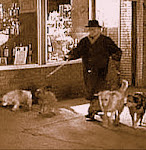 Alright. This post will be my attempt to explain the concept of Trinity in my own humble way as we move into the week past Trinity Sunday. Now I am no theologian and perhaps there will be serious flaws discovered in what I have to say, so please be kind.
Alright. This post will be my attempt to explain the concept of Trinity in my own humble way as we move into the week past Trinity Sunday. Now I am no theologian and perhaps there will be serious flaws discovered in what I have to say, so please be kind.To get started I want to introduce a few concepts in order to make my point. Let's start with the image with which I opened this post. I did a search on "three atom molecule" and as it happens that is an illustration of ozone. Let's call it it a God molecule though, shall we? The molecule is God - the three atoms are the Trinity - one and three at the same time.
Next I would direct you back to the title of this post, borrowed from the Umberto Eco's first novel. Apparently the true meaning of this title is not known. The book is a mystery set in the middle ages at a monastery in Italy. What I recall from Professor Elizabeth Dipple's class in college was that title might refer to the debate over universal concepts vs. physical objects. My philosophy is a bit weak, but the idea is that a universal rose exists in the ether and that all roses are but reflections of the universal rose and that if I ask you to imagine a rose, you are tapping into that universal rose.
Borrowing from that idea then, I want you to think about the various ways in which that rose might be "real." There would be that universal perfect rose. Next there are the roses that we imagine in our minds - can we think of them as being real (regardless of them being physically present?). Are not our thoughts real? These imagined roses may be a form of memory of physical roses. Finally there are the physical roses that you can see, touch, and smell.
So this is my thought on trying to explain the Trinity. Imagine that there is a universal Larry out there - this universal, perfect Larry is the equivalent of "God" as it relates to the Trinity. Now let's break down Larry into the components of the Trinity. There is my physical being sitting here typing away at my computer. Those folks around me can see me. They can touch my flesh. They can engage me in conversation. Yet these people around me do not understand the entire me through this physical being. They do not fully grasp the universal, perfect Larry. This is the God the Son third of the Trinity. Even my family and friends who have known me for years, those who would recognize this physical being in their presence instantly, do not fully know the God/me - the complete me.
Now let's consider the Larry that exists in the minds eye of all the folks who know me. In my mother's mind there is an image of her eldest son. Is not her image a real image? Now living hundreds of miles apart - this Larry is a more real Larry for her than my physical body. Or consider the many cyber friends I have who have never seen my physical body, never stood in my presence. I am a disembodied voice, words on a computer screen, digital images only. Am I no less real in their minds? Yet these mind images of me scattered around the globe are distinct in many ways from the physical me. Let's think of this as Larry/God the Spirit.
Finally, I myself carry an image of myself in my own mind. This is the me that lives in my head and never quite translates to the physical world. It is the part of my that always stands alone. The part of me that cannot be completely revealed for we can never really know what it feels like to be another person. This "head" translates to Larry/God the Father.
Each of these three Larry's compliments the others. The physical Larry can try and relate the "Father" Larry to the world either in person or through the Spirit Larry. All are pieces, however, of that three atomed molecule - "the universal Larry."
This is how I came to have a slightly better understanding of the Trinity. What do you think?














3 comments:
Well-written and intriguing...thanks for sharing your thoughts and ideas. What you say corresponds nicely to the messages in William P. Young's book 'The Shack', which I am currently reading.
I use something like that in the classroom. H2o: water, steam and ice.
The kids don't get it.
Is that platonism or aristolean thought? I can never remember which is which.
Helpful thoughts. Anytime I think I have it, I don't. 'Tis a mystery.
Post a Comment